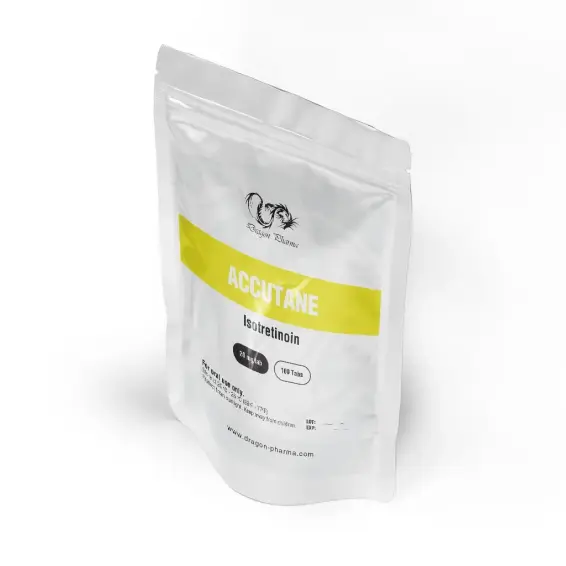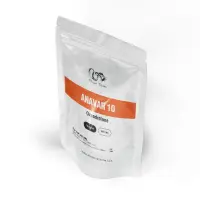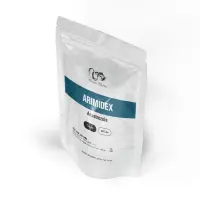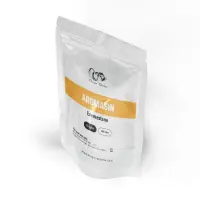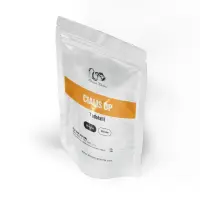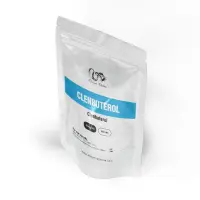- Manufacturer: Dragon Pharma
- Substance: Isotretinoin
- Dosage: 20 mg/tab
- Form:Oral
- Packing: 100 tabs
- Brand Name: Accutane
Shipping
Accutane by Dragon Pharma is a potent oral medication containing Isotretinoin, a retinoid widely recognized for treating severe acne that resists other therapies. By targeting the root causes of acne—excess oil production, clogged pores, and inflammation—Accutane delivers long-term skin clarity for those seeking a transformative solution. Ideal for individuals struggling with cystic or nodular acne, this product is a powerful tool to achieve a confident, blemish-free complexion.
What It Is
Accutane contains Isotretinoin, a synthetic derivative of vitamin A, classified as a retinoid. It's primarily used to treat severe acne (e.g., cystic or nodular acne) unresponsive to antibiotics or topical treatments. In medical settings, Isotretinoin is prescribed for conditions like acne vulgaris, rosacea, and certain keratinization disorders. Each tablet delivers 20 mg of Isotretinoin, with a typical course lasting 4–6 months, depending on the severity and physician guidance.
How It Works
Isotretinoin targets acne through four key mechanisms:
- Reduces sebum production by shrinking sebaceous glands.
- Prevents clogged pores by normalizing skin cell turnover.
- Decreases inflammation associated with acne lesions.
- Lowers Propionibacterium acnes (acne-causing bacteria) by reducing their oily environment.
Its systemic action ensures comprehensive acne treatment, with effects lasting months or years post-treatment. Isotretinoin's half-life is approximately 10–20 hours, requiring daily dosing for optimal results.
Accutane Benefits
- Clearer Skin: Eliminates severe acne, including cysts and nodules.
- Long-Lasting Results: Many users experience permanent acne reduction after one course.
- Reduced Oiliness: Minimizes shiny skin and clogged pores.
- Improved Confidence: Enhances appearance and self-esteem.
- Scar Prevention: Reduces the risk of acne scarring by addressing lesions early.
Who It's For
Accutane is ideal for men and women aged 18–40 with severe, treatment-resistant acne, such as cystic or nodular acne. It's suitable for those seeking a permanent solution to chronic skin issues but is not recommended for mild acne or those with manageable symptoms via topical treatments. Not for: Pregnant women (due to teratogenic risks), individuals under 18 without medical approval, or those with liver disease, high triglycerides, or mental health conditions without supervision. Always consult a physician before use.
How to Use
Dosage: Typical dosing is 0.5–1 mg/kg/day, split into two doses with food to enhance absorption (e.g., 20–40 mg/day for a 70 kg person). Treatment usually lasts 4–6 months, adjusted by a dermatologist based on response and side effects.
Administration: Take orally with a meal to improve bioavailability. Avoid taking on an empty stomach.
Results Timeline: Initial improvements are often seen within 1–2 months, with significant clearing by 3–6 months. Some users may experience an initial acne flare before improvement.
Stacking Suggestions
Accutane is typically used as a standalone treatment for acne. Combining with other systemic medications (e.g., antibiotics) is generally not recommended unless prescribed. Topical retinoids or moisturizers may be used to manage dryness or complement treatment, under medical guidance.
Side Effects
Accutane is effective but has potential side effects, requiring medical monitoring:
- Common: Dry skin, lips, and eyes; nosebleeds; sensitivity to sunlight.
- Hepatotoxicity: Elevated liver enzymes (requires regular blood tests).
- Lipid Changes: Increased triglycerides or cholesterol.
- Musculoskeletal: Joint or muscle pain in some users.
- Psychological: Rare cases of mood changes or depression (monitor closely).
- Hair: Temporary thinning or shedding in some cases.
Note: Accutane is highly teratogenic, causing severe birth defects. Women must use two forms of contraception and undergo regular pregnancy tests during treatment.
Post Cycle Therapy (PCT)
Accutane does not suppress testosterone or require PCT, as it's not an anabolic steroid. However, post-treatment skin care is crucial. Use non-comedogenic moisturizers and sunscreen (SPF 30+) to protect sensitive skin. Avoid aggressive exfoliation or cosmetic procedures (e.g., laser, waxing) for at least 6 months post-treatment.
Frequently Asked Questions
What is Accutane?
Accutane is a brand name for Isotretinoin, a retinoid used to treat severe acne, such as cystic or nodular acne, by reducing oil production, preventing clogged pores, and decreasing inflammation.
How does Accutane work?
Accutane reduces sebum production, normalizes skin cell turnover, decreases inflammation, and lowers acne-causing bacteria, addressing the root causes of severe acne for long-term skin clarity.
How long does it take for Accutane to work?
Initial improvements are typically seen within 1–2 months, with significant acne reduction by 3–6 months. An initial flare-up may occur before clearing.
Can you drink on Accutane?
Alcohol consumption is strongly discouraged on Accutane due to increased risk of liver toxicity and elevated triglycerides. Consult your doctor before consuming alcohol.
Does Accutane cause weight gain?
Accutane does not directly cause weight gain. However, changes in appetite or lifestyle during treatment may indirectly affect weight. Monitor diet and consult a physician if concerned.
Does Accutane cause hair loss?
Accutane may cause temporary hair thinning or shedding in some users due to its effect on skin and hair follicles. This is usually reversible post-treatment. Consult a dermatologist if persistent.
Is Accutane safe?
Accutane is effective for severe acne but carries risks, including liver issues, lipid changes, and teratogenicity. It's safe when used under medical supervision with regular monitoring and adherence to precautions.
Skin gets a bit dry but results are amazing. Face is clear after about 5 weeks. Highly recommend.
My trainer told me to try this and it works great. Skin is clear even while on cycle.
Taking 20mg each day. Barely any side effects and my skin looks way better. Totally worth it.
Skin cleared up after a few weeks. No more red bumps or irritation. Really good product.
